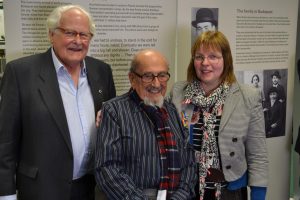HMDT Blog: Preparations for HMD 2016 – Firrhill High School
For many people across the UK, this time of year is a busy season as planning is well underway for events to mark Holocaust Memorial Day on or around 27 January. We are very pleased to welcome Sheila Watson from Firrhill High School in Edinburgh to our blog, sharing her perspective on planning a successful event for HMD.

Firrhill High School, like so many others across the UK, have marked HMD for a number of years and it is great to see pupils, parents and community members all joinng together and taking part in their activities each year.
Here are Sheila’s thoughts on what makes a good HMD activity:
Have you ever thought about organising an event to mark Holocaust Memorial Day? I certainly hadn’t a few years ago but on 28 January 2016 at Firrhill High School, where I work as an art teacher, we will be holding the official Edinburgh Schools HMD 2016 event.
Here’s how I got to this place, together with some ideas and pointers which might help you to create a memorable HMD 2016.
Why Holocaust Memorial Day?
I believe it is important to remember the Holocaust because we need to understand what human beings are capable of and never become indifferent to the suffering of others. Schools should mark HMD because it’s only through education that we can learn not to be the silent ones standing by.
I started out by becoming co-ordinating teacher for our Anne Frank Ambassadors initiative which led to memorial tree-planting and hosting the travelling Anne Frank exhibition in the school library. This culminated in Firrhill High School’s first ever Diversity Day with interactive workshops for all our S3 students (Red Card, Waverley Care, True Colours, See Me, LGBT Youth, Scottish Autism) and Harry Bibring, a Holocaust survivor sharing his personal testimony. There were spin-offs including a Diversity Day book and film – all involving students and the local community.
 Get a headline act!
Get a headline act!
OK, we’re not talking T in the Park, but having a focal point of an inspirational Holocaust survivor such as Zigi Shipper, who will be joining us in January, really helps. When Harry Bibring spoke to 300 students aged 14-15 and 50 members of the local community, you could hear a pin drop!
That being said, it’s not always possible or practical to invite a survivor to come to your event, especially in January with so many events taking place. The HMD website has lots of videos and interviews with survivors which you could play instead.
Interactivity is key
There’s no point in having folk sitting politely listening and occasionally looking at their watches. Involve your audience and make the event truly meaningful. Some of the ideas we’ve used before have included:
- One minute noise – get the audience to clap to celebrate the lives of the victims of the Holocaust.
- Unwanted shoes – ask your audience to bring a pair of unwanted shoes in good condition to the event, to be donated to Oxfam immediately after the event. Make a memorial for the evening to help remember all the victims of the Holocaust.
- Life-size remembrance tree – attendees write their personal answer to the question ‘Why remember the Holocaust?’ and hang a paper leaf on the tree or perhaps write short haiku on the Holocaust to hang on the tree.
- Q and A sessions or meet the Speaker at break-out times.
- Arrange tables at a reception with names of victims from the Yad Vashem Database, organised into ages and genders. All guests are matched with a victim of similar age and gender and given a link for them to go on to research more about the individual.
Everyone likes a cuppa!
We’re having two breaks as some folk will come straight from work – one after our headline speaker, Zigi Shipper, and a shorter one at end of our evening. We plan to have kosher food available, some musical performances from our students and see this as a chance for our diverse multi-faith audience of over 300 people to share food together and to encourage people to see past the prejudices that led to past genocides.
The event is to learn the lessons of past genocides. But is also to acknowledge, celebrate and respect the different cultures present in Edinburgh and what they bring to the city and Scotland.
If you’d like to chat further or hear how to avoid some of the mistakes I’ve made along the way, please feel free to contact me via our school website: www.firrhill.edin.sch.uk
The HMDT blog highlights topics relevant to our work in Holocaust and genocide education and commemoration. We hear from a variety of guest contributors who provide a range of personal perspectives on issues relevant to them, including those who have experienced state-sponsored persecution and genocide. The views expressed are those of the author and do not necessarily represent the views of HMDT.